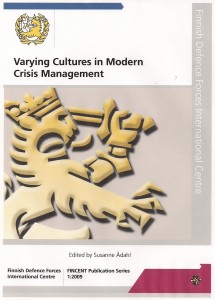
Link fixed 20 Dec 09
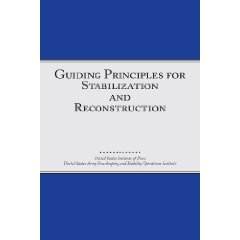
At its most fundamental this is without question the most extraordinary sensible and useful synthesis of all possible documents devoted to the subject, offering up a truly remarkable–just an amazing–framework for study and for planning.
The publisher failed to make full use of the Amazon tools for showing the Table of Contents at a minimum, and this error should be corrected immediately. Inside the Book is also recommended. I would normally reduce the book to four stars for its failure include all those outside the “traditional” national security community; for its lack of an index, and for its ignorance of most relevant books outside the narrow circle of stabilization & reconstruction groupies. However, this is such an incredibly gifted, intelligent, and meticulous presentation of vitally important information that I leave it at six star special, beyond five stars.
Still, to not be able to see in an index every page for key words like “water” or “intelligence” is infuriating.
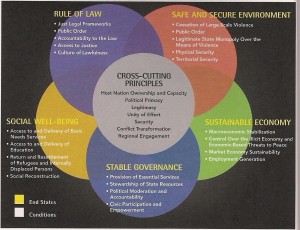 First, an overview of the contents, vastly more simple than the complex array of information presented in sub-sets of conditions, guidance, approach, and then elements.
First, an overview of the contents, vastly more simple than the complex array of information presented in sub-sets of conditions, guidance, approach, and then elements.
+ Introduction
+ Strategic Framework for Stabilization and Reconstruction
+ Cross-Cutting Principles
+ High-Level Trade-Offs, Gaps, and Challenges
+ Fundamentals of a Comprehensive Approach
+ End States
—Safe and Secure Environment
—Rule of Law
—Stable Governance
—Sustainable Economy
—Social Well-Being
+ Appendices
A. Resources List
B. Participants in Review Process
C. Summary of Strategic Frameworks Surveyed
D. Snapshot of COmpoments from Overarching Resources
E. Acronyms and Glossary of Selected Key Terms (incomplete, another annoyance that needs to be corrected)
Continue reading “Review: Guiding Principles for Stabilization and Reconstruction (Paperback)”
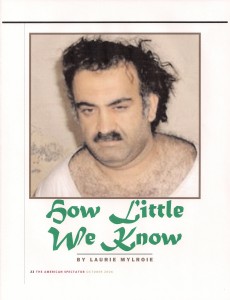
This contribution by Dr. Laurie Mylroie is so good we are also cataloging it as a Historic Contribution. See her Wikipedia page as well. The article appeared originally in The American Spectator (October 2006). As much as we disagree with many of her beliefs on this matter, we do agree that our national intelligence community was not up to the task of determining the best available truth across the board. Her two books:



Interestingly, the fraud of Al Gore and the International Panel on Climate Change (IPCC) combine with the total ineptitude of the Nobel Peace Prize “Committee” to jointly demonstrate that the fragmentation of scientific, economic, and political knowledge has now become catastrophic, and that “top-down” elite organizations such as the Nobel Preace Prize Committee pretends to be, are so ignorant of reality as to be counter-productive. Below is an illustration of our current vision. As we suggested recently to key United Nations officials and a select number of Ambassadors in Washington, D.C., crisis is an opportunity for innovation. Brazil, India, China, and Russia certainly understand this. In Copenhagen, the leaders can choose to bury the IPCC and commit instead to creating the World Brain Institute with an embedded Global Game that connects all human minds to all relevant information in all languages all the time.
UN World Brain Institute and Global Game Talking Points (2 pages)
2008 COLLECTIVE INTELLIGENCE: Creating a Prosperous World at Peace
Review: The Fortune at the Bottom of the Pyramid–Eradicating Poverty Through Profits (Hardcover)
Review: All Rise–Somebodies, Nobodies, and the Politics of Dignity
Review: Creating a World Without Poverty–Social Business and the Future of Capitalism
Review: The Wealth of Networks–How Social Production Transforms Markets and Freedom (Hardcover)
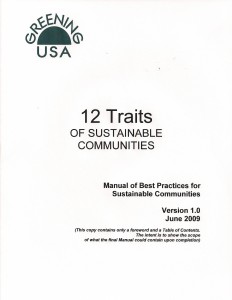
This is UNDER CONSTRUCTION but still useful to intelligence analysts thinking about stabilization & reconstruction, and when combined with our revolution preconditions matrix, can inform Strategic Communications as well as Information Operations (IO). Notice the emphasis on identifying INDICATORS, in political science this is called “operationalization” and serves to connect outcomes with indicators with data to be observed and evaluated.

Settling An Intelligence Turf War
By Walter Pincus Washington Post November 17, 2009 Pg. 29
Early last week, several long-festering bureaucratic issues that had arisen between Director of National Intelligence Dennis C. Blair and CIA Director Leon Panetta had to be settled by national security adviser James L. Jones, through some Solomon-like decisions.
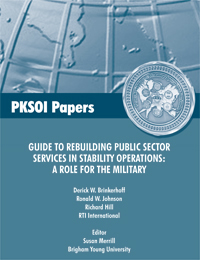
Phi Beta Iota: The US Intelligence Community (both civilian and military) still has not accepted the fact that 60% of its effort should be focused on Global Coverage (e.g. the Third World and the non-military high-level threats to humanity) and on relevant information and tailored intelligence necessary to support Stabilization & Reconstruction Operations as well as what General Al Gray, USMC (Ret), then Commandant of the Marine Corps, called “peaceful preventive measures.” See also: